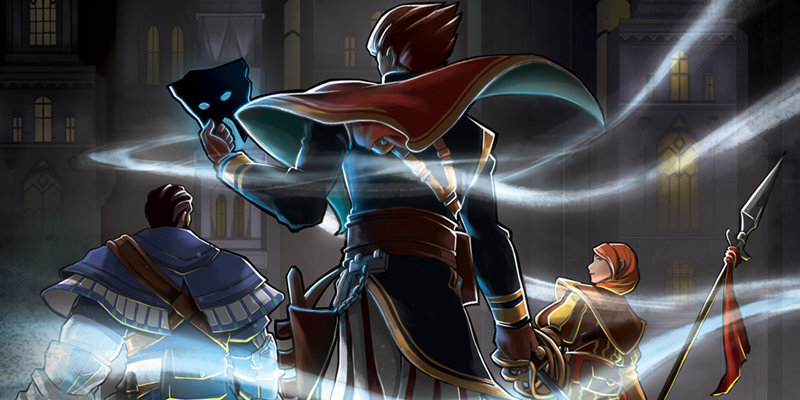
Masquerada: Songs and Shadows
Genre: RPG
Developer: Witching Hour Studios
Publisher: Ysbryd Games
Platforms: PlayStation 4, Xbox One, PC
A review by Matthew Codd
 Masquerada: Songs and Shadows is quite a different game than you might expect from looking at screenshots or watching videos. The isometric perspective and the real-time, pause-based combat call to mind the likes of Baldur’s Gate and Pillars of Eternity, so you might expect a similar focus on character customization and role-playing as well. Masquerada isn’t interested in letting you make your own mark on a world so much as it wants to take your hand and guide you through an intricately woven tale. It’s such an enchanting, thought-provoking, and expertly-delivered story though, and I wouldn’t have it any other way.
Masquerada: Songs and Shadows is quite a different game than you might expect from looking at screenshots or watching videos. The isometric perspective and the real-time, pause-based combat call to mind the likes of Baldur’s Gate and Pillars of Eternity, so you might expect a similar focus on character customization and role-playing as well. Masquerada isn’t interested in letting you make your own mark on a world so much as it wants to take your hand and guide you through an intricately woven tale. It’s such an enchanting, thought-provoking, and expertly-delivered story though, and I wouldn’t have it any other way.
The game takes place in the Citte della Ombre, an island city-state reminiscent of Venice. It’s a city that’s only recently become independent following a long war, and this independence is thanks to artifacts known as Mascherines. These masks bestow magical powers on any who wear them, but dying while wearing one causes the Mascherines to disintegrate.
Years on from the war, Mascherines are becoming increasingly scarce. To own one isn’t just a source of magic, but social power as well; it makes you part of the Masquerada, the city’s ruling elite. A struggle for governance plays out constantly between the five sects of Masquerada, and the maskless masses – the Contadini – live in their shadow. The metaphor here is anything but subtle: Mascherines are to Ombre what money and capital are to the real world.
This sort of allegorical look at class conflict isn’t rare in RPGs (or in fantasy fiction in general), but what sets Masquerada apart is the depth and nuance with which it looks at the issue. Instead of the simple dichotomy of miserly nobles set against a backdrop of extreme poverty, Ombre shows a full spectrum of people and their relationships to the Mascherines. There are the destitute and the rebellious groups who fight for a sort of socialist revolution. There are the middle classes, those Contadini who live happy and fulfilling lives despite their lack of political agency, who can easily turn a blind eye to the city’s inequalities. Among the Masquerada, there are three greedy cartoon villains, but there are also the well-meaning elites trying to make things better for everyone from within the system.

At the centre of all of this is Cicero Gavar, a charming, roguish hero and a former Masquerada detective. For reasons unknown (at least initially), he was banished from Ombre a few years ago, but now he’s been summoned back to help investigate a missing persons case. He has little interest in the political tug-of-war or in the city’s social problems; he just wants to get the job done, get paid, and get gone. It’s never as simple as that though, and he increasingly finds himself caught up in a feud between the Masquerada and the rebellious Maskrunners.
As well as being an engrossing fantasy whodunit full of twists and surprises, it takes a fascinating perspective on the issues that Masquerada canvasses. Cicero is a man of extreme privilege, despite some unfortunate turns, and that’s something he slowly learns to acknowledge and address over the course of the game. It’s a slow and subtle arc, mostly playing out in the background to the mystery that drives the plot forward, but Cicero is a very different character at the end of the game to who he was at the start.
The companions he meets along the way offer a glimpse into other aspects of life in Ombre. Some are Masquerada, some are Contadini, some are Maskrunners, but all are inextricably connected to the Mascherines and the social systems built upon them. You get a look into the role of religion, the complexities of the social hierarchy, the things that gave rise to the Maskrunners, and the attitudes towards queer people, among other things. Every facet of Masquerada’s story is captivating, even down to the expansive lore notes, which are all written from Cicero’s perspective and filled with personality and humor.

Indeed, there’s so much focus on story and storytelling that the combat and RPG systems seem almost an afterthought. The only battles to be fought are those relevant to the story, and instead of an experience-based leveling system you just get a skill point upon each victory. This won’t gel with everyone, but I really enjoyed the focus on making combat and storytelling cohesive.
Battles themselves can be as easy or as hard as you want. In the easiest difficulty setting, you can pretty much auto-battle your way through the whole game; on the hardest, you’ll need to make full use of some complex systems. The most significant are elemental tags: certain skills will leave a mark on the target corresponding to one of the four elements, and these can then be triggered by using other elemental spells. Depending on the combination of elements between the tag (or tags) and the attack used to set them off, you can get a wide range of different effects, from bonus damage to status effects. It can be tricky to memorize all the different combinations, and looking them up in battle is a pain, but mastery of this system is the key to success on harder settings.
Something that Masquerada has been criticized for a lot is its linearity. There are very few sidequests, especially by RPG standards, and most of the game is a straightforward progression from one scene to the next with little room to explore or deviate from the path. Given Ombre’s beauty, I wouldn’t object to having more freedom to roam, but I do think that the game benefits from its linearity far more than it suffers. As I keep saying, story is at its heart, and this approach allows for the pacing it needs to make its mark. In a world full of bloated, open-world games, it’s a nice change to play a concise, focused RPG.

Wrapping all this up is an absolutely gorgeous, renaissance-inspired art style. It’s bright and intricate, with cel shading that lets each colour pop and allows the detail in the linework to shine through. The operatic soundtrack won’t be to everyone’s taste, but fits the Venetian aesthetic perfectly.
The highlight of the Masquerada, presentation-wise, is the voice acting. This game has some of the best spoken dialogue I’ve ever heard, from indie or AAA, courtesy of some of the best actors in the business. Felicia Day, Jennifer Hale, Ashly Burch, Dave Fennoy, and Matthew Mercer are just a few of the people involved, and they all give some of the finest performances of their careers.
Verdict
Play it! As long as you don’t expect a lengthy, open ended RPG like the games it superficially calls to mind, you’re in for a treat with Masquerada: Songs and Shadows. The story it tells is not to be missed – part detective mystery, part Venetian fantasy, and with a potent examination of class conflict laced throughout. The stunning art and sublime voice acting fits this all together beautifully.



![[COLUMN] QUARTERS DOWN #1: CHUCHU ROCKET UNIVERSE](https://geekd-out.com/wp-content/uploads/2019/10/ChuChu1-150x150.jpg)